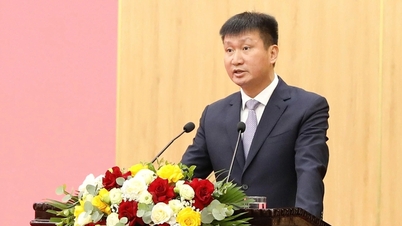
Students learn Mandarin in a classroom at Tai Zhong School No. 2 in Sihanoukville, Cambodia - Photo: AFP
Research published in the journal Nature Aging on November 10 shows that the ability to use multiple languages can slow down the biological aging of the brain, thereby helping to protect memory and concentration in old age.
Study co-author Agustín Ibañez, a neuroscientist at Adolfo Ibáñez University in Chile, said the team wanted to address "one of the long-standing questions in aging research: whether multilingualism actually helps delay this process."
He said many previous studies have suggested speaking multiple languages improves memory and attention, but they were often based on small samples or unreliable measurement methods.
Cognitive neuroscientist Christos Pliatsikas (University of Reading, UK) commented: "The effect of speaking multiple languages on aging has been controversial, but there has never been a study as large and convincing as this one." He said that this result could "turn the field of research".
Ms. Susan Teubner-Rhodes, a cognitive psychologist at Auburn University (USA), said this discovery could encourage many people to "proactively learn or maintain the use of their second language".
The study looked at 86,000 healthy people, aged 51 to 90, in 27 European countries. The team used a computational approach to determine the “biological-behavioral age gap,” which is the difference between a person’s predicted biological age – based on health, lifestyle, and education – and their actual age. A larger gap indicates faster aging.
When compared with the number of languages each person self-reported speaking, the team found that monolinguals were twice as likely to experience “accelerated aging” as those who spoke two or more languages. This effect increased with the number of languages spoken.
“Just knowing one additional language reduces the risk of accelerated aging, and speaking two or three has an even stronger effect,” says Ibañez.
The large sample size and geographic diversity support the conclusion that multilingualism – and not other factors such as immigration status or income level – is protective, says Ms Teubner-Rhodes. She also suggests extending the study to regions outside Europe to get a more complete picture.
The authors hope the results will prompt policymakers to encourage foreign language learning in education systems as an investment in long-term brain health.
Source: https://tuoitre.vn/hoc-ngoai-ngu-giup-nao-tre-lau-20251111130533049.htm






































































































![Dong Nai OCOP transition: [Article 3] Linking tourism with OCOP product consumption](https://vphoto.vietnam.vn/thumb/402x226/vietnam/resource/IMAGE/2025/11/10/1762739199309_1324-2740-7_n-162543_981.jpeg)








Comment (0)